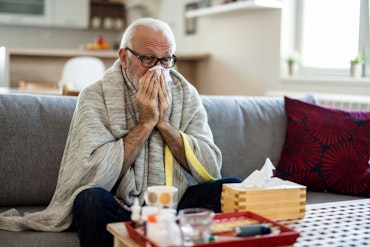Welfare checks for elderly who suspend home care services
Minister for Aged Care and Senior Australians, Richard Colbeck, has announced there will be welfare checks conducted on older Australians who decide to defer their home care services during the current COVID-19 pandemic.
![<p>If a recipient of home care services decides to suspend their care services at home, the recipient will receive a regular phone call to check up on how they are managing. [Source: Shutterstock]</p>](https://agedcareguide-assets.imgix.net/news/articles/shutterstock_205112572.jpg?fm=pjpg&format=auto&w=550&q=65)
If a recipient of home care services decides to suspend their care services at home, the recipient will receive a regular phone call to check up on how they are managing. [Source: Shutterstock]
If a recipient of home care services decides to suspend their care services at home so they can avoid contracting the coronavirus, the recipient will receive a regular phone call to check up on how they are managing.
While Minister Colbeck understands why older Australians may decide to defer their home care services, he says these welfare checks will ensure those senior Australians are safe during this crisis.
“We don’t want people to fall through the cracks. Elderly people who receive home care visits are often extremely vulnerable,” says Minister Colbeck.
“It’s clear some Senior Australians are anxious about the risks of visits from providers. Of course, it’s their choice to receive or not receive care, but we remain determined to ensure those who need support are still receiving it.”
“Care providers are trained in infection control to help stop the spread of coronavirus and protect clients in their care. All the proper procedures are being put in place to ensure the highest level of protection.”
Minister Colbeck says people receiving services through a home care package can take temporary leave and stop receiving home care services for a while, either for a hospital stay, transition care (following a hospital stay), residential respite or social reasons.
A person should agree with their care provider when the services will recommence and their leave ceases.
During the COVID-19 epidemic, the Government has decided to not put a limit on the period of social leave that a person can take.
The Government will continue to pay the full basic subsidy and any supplements that apply for up to 28 days in a financial year if a person takes leave for social reasons. These leave days do not have to be taken in a row.
However, if this person takes more than 28 days of social leave in that financial year, which resets on 1 July, the subsidy will be paid by the Government at 25 percent of the basic subsidy rate.
The Australian Government is working with consumer organisations, like the Older Persons Advocacy Network (OPAN) to provide these additional supports.
OPAN will be receiving referrals from Home Care Package (HCP) and Commonwealth Home Support Programme (CHSP) providers if a client, or their family, decides to either reduce or cancel the services because of COVID-19 concerns.
Other referrals can also be made if people require extra support because of the current restrictions put in place by the Government.
“The aged care provider has a responsibility to notify the care recipient or family of the referral to OPAN and that they will receive a call-back,” says Minister Colbeck.
“The welfare of people in care is our absolute priority and I’m determined to ensure they can continue to access the services they need.”
Leading Age Services Australia (LASA) said they are glad to see that the Government will be undertaking welfare checks on older Australians who defer their home care services, however, home care services are providing a more safe and essential service during this pandemic.
Chief Executive Officer (CEO) of LASA, Sean Rooney, says, “Older people are understandably worried about their health in the current outbreak but the last thing we want is for those who rely on vital care and support in their homes is to go without these services. This could put at risk their safety and wellbeing.
“The age services sector has been on rising levels of alert since January this year with regards to COVID-19 and has been implementing a number of measures to ensure strong infection control and to minimise transmission risk.
“Providers are proactively reducing the risk by limiting the number of clients that staff members visit and by adopting enhanced cleaning, hygiene and training. They are also undertaking regular check-ins with all of their clients.
“If a home care recipient has any concerns about receiving their regular services in their home during the pandemic we encourage them to discuss these issues directly with their care provider. This way they can explore what measures are in place to reduce the risk of infection for both the care recipient and the caregiver.”
For those who need it, the additional service from OPAN offers a further safety net to ensure that older Australians are getting the best support possible.
Senior Australians who need support from OPAN can contact them on 1800 700 600.
For more information for older Australians around the coronavirus, head to the Department of Health website, or visit the Aged Care Guide’s COVID-19 update page.
Do you have any questions about the coronavirus that you want answered? Tell us in the comments below or email journalist@dps.com.au.











![The new Aged Care Act exposure draft is slated for release in December of 2023, but advocates hope to see it rolled out on January 1, 2024. [Source: Shutterstock]](https://agedcareguide-assets.imgix.net/news/articles/wp/agedcareact__0811.jpg?fm=pjpg&w=520&format=auto&q=65)












Comments